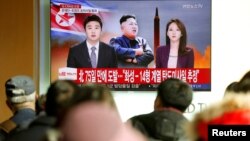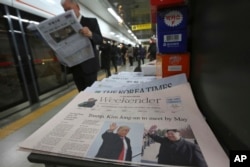North Korea is contending that its recent "dialogue peace offensive" with the United States and South Korea is the result of national strength, not pressure from international economic sanctions aimed at ending Pyongyang's nuclear and missile tests.
A state television commentary late Tuesday did not mention either of the pending summits with South Korea and the United States, including a prospective face-to-face meeting U.S. President Donald Trump agreed to hold with North Korean leader Kim Jong-un by the end of May. But the commentary was the first allusion to the thaw in diplomatic relations between Pyongyang and Washington and Seoul.
The woman reading the commentary said there has been a "dramatic atmosphere for reconciliation" with the South and "a sign of change" with the United States.
She said Pyongyang's overtures to Washington and Seoul came from a position of strength, not from weakness.
"The dialogue peace offensive" of the North Korean government, she said, "is an expression of self-confidence as it has acquired everything it desires."
The commentary attacked military opponents to the talks in the United States, South Korea and Japan for questioning whether the talks should be held.
"Such rubbish as 'result of sanctions and pressure' ... spread by hostile forces is just as meaningless as a dog barking at the moon," the government commentary said.
"It is really an expression of small-mindedness for the riff-raffs to spoil the atmosphere and say this or that even before the parties concerned are given a chance to study the inner thoughts of the other side and are seated at a negotiating table," North Korea said.
Summit in the offing?
Trump has repeatedly pushed for tough sanctions imposed by the United Nations against North Korea as Pyongyang carried out multiple nuclear and missile tests. He has repeatedly taunted Kim, calling him "Little Rocket Man," before unexpectedly agreeing earlier this month to talks with Kim after South Korean diplomats, in a White House meeting, presented Trump with a message from Pyongyang offering to hold a summit.
No date or venue for the summit has been announced, however.
In the United States, a new poll by Quinnipiac University said 65 percent of American voters believe the United States will be able to resolve its differences with North Korea diplomatically, while 16 percent believe the United States will have to use military force. The poll said voters, by a 66-24 margin, approve of Trump meeting with Kim, but by a similar result, 65-26, say that North Korea will not give up its nuclear weapons.
South Korea and the United States said Tuesday they plan to resume annual joint military exercises on April 1, although shortening its main drill by a month. The North has frequently complained about the South Korean-U.S. drills, but as part of the agreement for the planned summit with the United States has agreed to not publicly protest this year.
South Korean President Moon Jae-in said a three-way summit between the two Koreas and the United States is possible, depending on the success or failure of the meetings between the two Koreas and the U.S.-North Korean summit.
"We must completely resolve the issues of denuclearizing the Korean Peninsula and establishing peace," Moon said.





